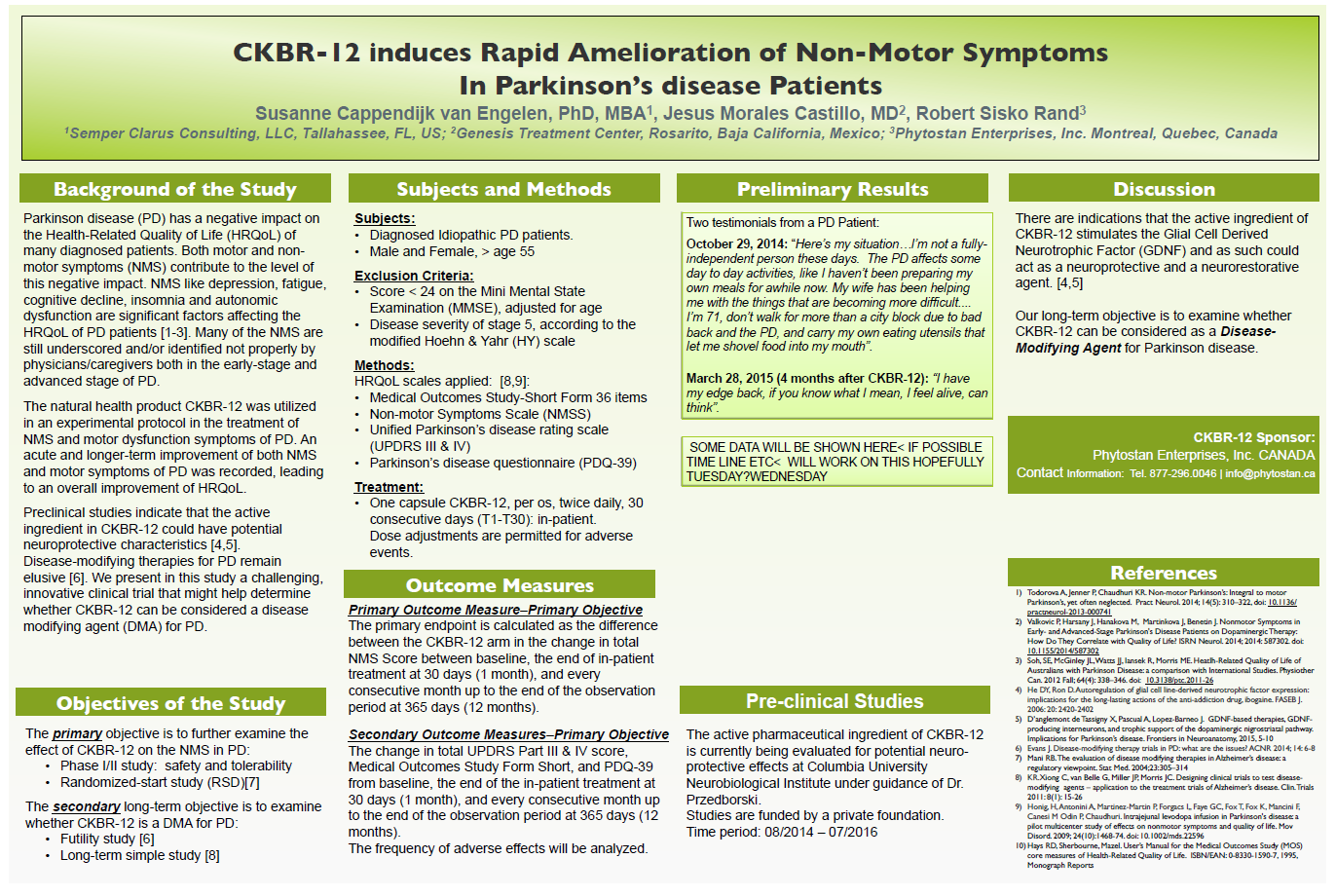
New York Academy of Science Conference:
Non-Motor Symptoms: Unraveling the “Invisible” Face of Parkinson’s disease
Genesis was Awarded the Prestigious Poster Presentation for its development of CKBR-12 For Parkinson’s Treatment.
The two major neurodegenerative diseases Alzheimer’s disease (AD) and Parkinson’s disease (PD) are characterised by low levels in the brain of the neurotransmitters acetylcholine (ACh) and dopamine (DA), respectively. Clinical treatment of these two conditions is palliative and relies, in most cases, on improving stimulation at the relevant receptors by either increasing levels of the endogenous neurotransmitter or by the use of substances which have a similar agonist response. Natural products continue to provide useful drugs in their own right but also provide templates for the development of other compounds. The major advances in the treatment of AD have been the use of acetylcholinesterase inhibitors such as galantamine, huperzine A, physostigmine and its derivatives to increase the levels of ACh rather than the use of cholinergic compounds, although compounds with nicotinic properties have attracted some interest. In contrast, the treatment of PD has relied on the elevation of DA levels by use of L-DOPA, its precursor, and by the administration of dopaminergic agonists, especially the ergot alkaloid derivatives. The use of inhibitors of enzymes that cause breakdown of DA is an avenue which is being explored. As well as the major natural products of clinical interest, the paper discusses the chemistry, activity and usage of the constituents of plants used in traditional medicine for the treatment of diseases presenting symptoms similar to those characteristic for Alzheimer’s or Parkinson’s disease.
CKBR-12 Induces Rapid Amelioration of Non-Motor Symptoms in Parkinson’s disease Patients
Susanne Cappendijk van Engelen, PhD, MBA1, Louis Marks, PhD, and Robert Rand3
1SemperClarus Consulting, LLC, Tallahassee, Florida, United States; 2Genesis Treatment Center, Rosarito, Baja California; 3Phytostan Enterprises, Inc. Montreal, Quebec, Canada
Early in the course and during the further progression of Parkinson’s disease (PD) patients experience a plethora of non-motor symptoms (NMS). In contrast to the well-recognized and well-accepted PD motor symptoms, such as involuntary shaking and muscle stiffness, numerous physicians and/or caretakers might still not realize the impact of the NMS on their patient’s Health-Related Quality of Life (HRQOL). A recent performed survey study (end of 2014) demonstrated that for many PD patients the array of NMS, such as sleep disorders, increased anxiety, uncertainty about the risk of developing dementia, urinary incontinence are significant contributors to a decreased HRQOL score.
Patient-Reported Outcome tools related to evaluate the HRQOL were recently employed to analyze data collected from a study in which the natural health product CKBR-12 was utilized in an experimental protocol in the treatment of NMS and motor dysfunction symptoms of PD. Using a holistic patient-driven view of care, we demonstrated an acute and longer-term interruption of both NMS and motor symptoms of PD, leading to an overall improvement of patient HRQOL.
Our unexpected, promising and previously unreported results gave rise to the filing of a US and PCT provisional patent, Rapid Method for Interrupting Motor and Non-Motor Symptoms of Parkinson’s Disease, prompting calls for expanded patient access to CKBR-12.
.